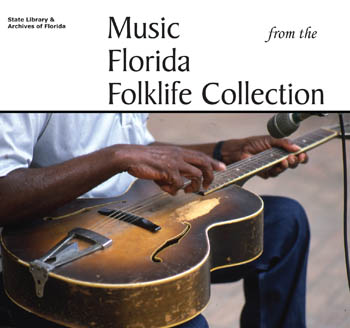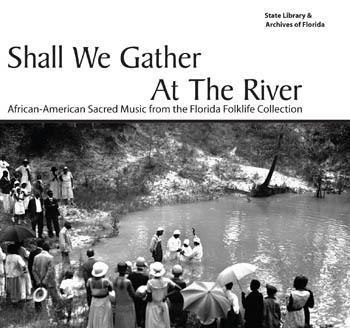


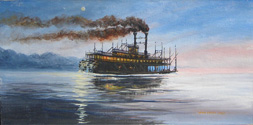

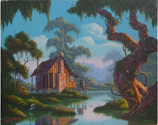
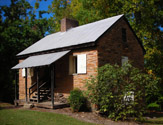









Southern Exposure
The Florida Memory Project
Sharing Folk Recordings from the Sunshine State
Sharing Folk Recordings from the Sunshine State
In recent years, concerted efforts have been made to preserve the American South's illustrious past and vanishing character. Compelling arguments have been made that the region is experiencing a universalization and, no doubt, the South isn't what it used to be. Associated Press writer Allen G. Breed's article, "Old South's distinction melts away," appeared in the December 29, 2005 Atlanta Journal-Constitution, shedding considerable light on this notion. In the wake of the South's evolution, thankfully, various southern states, nonprofit organizations and institutions of higher learning have created archives, amassed important collections and made available invaluable resources for the enlightenment of aficionados of the region everywhere.
A number of important publications, ranging from online resources such as the New Georgia Encyclopedia and Southern Spaces to popular magazines like Oxford American and Living Blues, hail from some of the South's most important universities. Then, there are important collections like those of the Memphis-based nonproft Center for Southern Culture and Documenting the American South, a project of monumental proportions sponsored by the University of North Carolina at Chapel Hill.
Intrinsic to Florida history and its impact on the South, the Florida Memory Project stands out as one of the more comprehensive southern collections. The web-based repository utilizes selected original records, photographs and other materials from the Archives of Florida and collections of the State Library. Components include the Florida Photographic Collection (a searchable image database of over 150,000 online photographs), the Online Classroom, Highlights of Florida History (a collection of rare historic documents from the state's past), Collections (including land grants, genealogical records and folk music) and the Timeline (an interactive tour of Florida's history).
While retaining and maintaining old photographs and important papers are essential for history's sake, the preservation of music is equally imperative. Particularly in the South, memorable folk songs and melodies have been enjoyed by music lovers of all ages. Like oral histories and good storytelling, great music has often been shared with successive generations, ensuring its immortality. The Florida Memory Project's diverse and vast collection of folk music includes a number of songs that will stand the test of time, and these tunes can be enjoyed in the form of rare clips and historic field recordings as well as tapings of live performances from past Florida Folk Festivals. Through four compact discs, serious musicologists and dedicated fans can enjoy hours of music . . . the kind of music that reflects the ethos of the Southern spirit and elicits an emotional response.
The best part is that all of the compact discs are available on a complimentary basis, and songs may be downloaded individually at no charge from FloridaMemory.com. Brief synopses of the CDs are as follows. To download individual songs or entire albums to your computer for free, simply right-click onto the album titles below or the album covers.
A number of important publications, ranging from online resources such as the New Georgia Encyclopedia and Southern Spaces to popular magazines like Oxford American and Living Blues, hail from some of the South's most important universities. Then, there are important collections like those of the Memphis-based nonproft Center for Southern Culture and Documenting the American South, a project of monumental proportions sponsored by the University of North Carolina at Chapel Hill.
Intrinsic to Florida history and its impact on the South, the Florida Memory Project stands out as one of the more comprehensive southern collections. The web-based repository utilizes selected original records, photographs and other materials from the Archives of Florida and collections of the State Library. Components include the Florida Photographic Collection (a searchable image database of over 150,000 online photographs), the Online Classroom, Highlights of Florida History (a collection of rare historic documents from the state's past), Collections (including land grants, genealogical records and folk music) and the Timeline (an interactive tour of Florida's history).
While retaining and maintaining old photographs and important papers are essential for history's sake, the preservation of music is equally imperative. Particularly in the South, memorable folk songs and melodies have been enjoyed by music lovers of all ages. Like oral histories and good storytelling, great music has often been shared with successive generations, ensuring its immortality. The Florida Memory Project's diverse and vast collection of folk music includes a number of songs that will stand the test of time, and these tunes can be enjoyed in the form of rare clips and historic field recordings as well as tapings of live performances from past Florida Folk Festivals. Through four compact discs, serious musicologists and dedicated fans can enjoy hours of music . . . the kind of music that reflects the ethos of the Southern spirit and elicits an emotional response.
The best part is that all of the compact discs are available on a complimentary basis, and songs may be downloaded individually at no charge from FloridaMemory.com. Brief synopses of the CDs are as follows. To download individual songs or entire albums to your computer for free, simply right-click onto the album titles below or the album covers.
Music from the Florida Folklife Collection contains twenty two tracks, ranging from excerpts of public radio interviews with folklorists Peggy Bulger and John Marshall to the exciting latin sounds of Mariachi Jalisco and the traditional gospel harmonies of the Amigo Male Singers and Progressive Seven Shaped Note Singers.
Sample Tracks:
Shove It Over
Zora Neale Hurston
Recorded June 18, 1939 by Stetson Kennedy and Herbert Halbert [Works Progress Administration], WPA Florida Folklife Project, Jacksonville, Florida
Sample Tracks:
Shove It Over
Zora Neale Hurston
Recorded June 18, 1939 by Stetson Kennedy and Herbert Halbert [Works Progress Administration], WPA Florida Folklife Project, Jacksonville, Florida
A 1939 Works Progress Administration (WPA) recording features Zora Neal Hurston (1891?-1960), the noted folklorist and novelist who was born in the all-black town of Eatonville, Florida. Hurston became a prominent figure during New York's Harlem Renaissance and published Mules and Men (1935), a collection of African American folktales, and four novels, including Their Eyes Were Watching God (1937). Prior to singing the catchy work song "Shove It Over," Hurston explained, "It was sung to me by Charlie Jones on a railroad construction camp near Lakeland, Florida." When asked by her interviewer when had she first heard "Shove It Over," Hurston replied, "Thirty three . . . It was in 1933."
That Old Time Religion
Julia Dawson
A former slave recounts her life and sings, Recorded May 1, 1955 by Foster Barnes [Stephen Foster Center], 1955 Florida Folk Festival, White Springs, Florida
Another clip of particular significance is Julia Dawson's performance of "That Old Time Religion." In this recording from the 1955 Florida Folk Festival in White Springs, Dawson---a centenarian at the time---recounts her life as a former slave before enthusiastically belting out a moving a cappella solo of the old spiritual.
That's Alright
Johnny Brown
Recorded May 10, 1978 by Brenda McCallum, [Florida Folklife Program], North Florida Folklife Project, St. Petersburg, Florida
And, lastly, Blind Johnny Brown (1910-1986) delivers a rendition of "That's Alright." Born in Montgomery with no visual impairment, Brown moved to Florida in 1925. Influenced by blues and gospel recordings of the day, including records by blues icon Blind Lemon Jefferson, Brown would eventually become a formidable blues guitarist and lose his sight. A virtual treasury of blues and gospel numbers, dozens of songs performed by Brown were recorded for the North Florida Folklife Project in 1978 by Stephen and Brenda McCallum.
That Old Time Religion
Julia Dawson
A former slave recounts her life and sings, Recorded May 1, 1955 by Foster Barnes [Stephen Foster Center], 1955 Florida Folk Festival, White Springs, Florida
Another clip of particular significance is Julia Dawson's performance of "That Old Time Religion." In this recording from the 1955 Florida Folk Festival in White Springs, Dawson---a centenarian at the time---recounts her life as a former slave before enthusiastically belting out a moving a cappella solo of the old spiritual.
That's Alright
Johnny Brown
Recorded May 10, 1978 by Brenda McCallum, [Florida Folklife Program], North Florida Folklife Project, St. Petersburg, Florida
And, lastly, Blind Johnny Brown (1910-1986) delivers a rendition of "That's Alright." Born in Montgomery with no visual impairment, Brown moved to Florida in 1925. Influenced by blues and gospel recordings of the day, including records by blues icon Blind Lemon Jefferson, Brown would eventually become a formidable blues guitarist and lose his sight. A virtual treasury of blues and gospel numbers, dozens of songs performed by Brown were recorded for the North Florida Folklife Project in 1978 by Stephen and Brenda McCallum.
While sacred songs are featured on all of the Project's CDs, one record is dedicated entirely to gospel music. Shall We Gather at the River: African American Sacred Music from the Florida Folklife Collection presents the sounds of national acts such as the legendary Dixie Hummingbirds, but also features recordings otherwise shrouded in obscurity such as an excerpt from a church service at the Testerina Primitive Baptist Church or the Antioch Junior Choir's rousing performance of "Jesus Be a Fence Around Me."
Sample Tracks:
I've Got Heaven on My Mind
Hickory Bottom Harmoneers
Recorded May 1, 1955 by Foster Barnes [Stephen Foster Center] at the 1955 Florida Folk Festival, White Springs, Florida
Sample Tracks:
I've Got Heaven on My Mind
Hickory Bottom Harmoneers
Recorded May 1, 1955 by Foster Barnes [Stephen Foster Center] at the 1955 Florida Folk Festival, White Springs, Florida
In typical call-and-response fashion, the Hickory Bottom Harmoneers sing "I've Got Heaven on My Mind." Recorded at the 1955 Florida Folk Festival, the group begins the song slowly and simply, but subtly increases the speed and intensity as two vocalists take turns singing the lead, effectively driving home its infectious melody and message of hope.
Babylon Is Falling Down
Deacon Dan Smith with Nick Hallman & the Georgia Sea Island Singers
Recorded August 30, 1975 by the Stephen Foster Center at the 1975 Florida Folk Festival, White Springs, Florida
"Babylon Is Falling Down," performed by Deacon Dan Smith with Nick Hallman and the Georgia Sea Island Singers, is a wonderful story song filled with vivid imagery. Utilizing scripture from Daniel, the group tells the story of Nebuchadnezzar with simplistic, rhythmic instrumentation---harmonica, acoustic guitar and tambourine. This song, incidentally, is one of two tracks on Shall We Gather at the River featuring the Georgia Sea Island Singers, a group believed to have been organized around 1920 as the Spiritual Singers Society of Coastal Georgia by Lydia Parrish. First recorded by Smithsonian folklorist Alan Lomax on his 1959-60 field recording trip through the South, the group has long been noted for preserving the rich African American heritage of the Georgia coast.
Jesus Met the Woman at the Well
The Versiteers
Recorded on May 27, 1995 by the Florida Folklife Program at the 1995 Florida Folk Festival, White Springs, Florida
And, finally, The Versiteers sing a soul-stirring version of "Jesus Met the Woman at the Well," a song composed by James W. Alexander and Chicago gospel publisher Kenneth Morris and popularized decades ago by history's most celebrated gospel performer, Mahalia Jackson (1911-1972).
Babylon Is Falling Down
Deacon Dan Smith with Nick Hallman & the Georgia Sea Island Singers
Recorded August 30, 1975 by the Stephen Foster Center at the 1975 Florida Folk Festival, White Springs, Florida
"Babylon Is Falling Down," performed by Deacon Dan Smith with Nick Hallman and the Georgia Sea Island Singers, is a wonderful story song filled with vivid imagery. Utilizing scripture from Daniel, the group tells the story of Nebuchadnezzar with simplistic, rhythmic instrumentation---harmonica, acoustic guitar and tambourine. This song, incidentally, is one of two tracks on Shall We Gather at the River featuring the Georgia Sea Island Singers, a group believed to have been organized around 1920 as the Spiritual Singers Society of Coastal Georgia by Lydia Parrish. First recorded by Smithsonian folklorist Alan Lomax on his 1959-60 field recording trip through the South, the group has long been noted for preserving the rich African American heritage of the Georgia coast.
Jesus Met the Woman at the Well
The Versiteers
Recorded on May 27, 1995 by the Florida Folklife Program at the 1995 Florida Folk Festival, White Springs, Florida
And, finally, The Versiteers sing a soul-stirring version of "Jesus Met the Woman at the Well," a song composed by James W. Alexander and Chicago gospel publisher Kenneth Morris and popularized decades ago by history's most celebrated gospel performer, Mahalia Jackson (1911-1972).
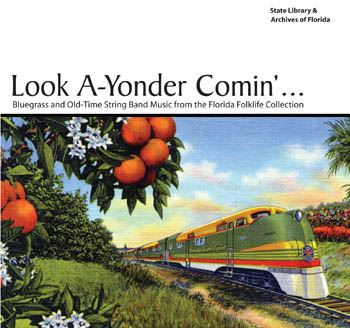
With its diverse assortment of songs, Look A-Yonder Comin' . . . Bluegrass and Old-Time String Band Music from the Florida Folklife Collection is bound to provide much listening pleasure to any fan of traditional bluegrass music. Artists include Town Hall, Norman and Nancy Blake and the Pine Valley Boys of Tifton, Georgia, and songs are as diverse as "Baby I Am Georgia Bound," "Hot Corn, Cold Corn" and "Fifty Miles of Elbow Room."
Sample Tracks:
Winnsboro Cotton Mill Blues
The Peyton Brothers
Recorded May 30, 1993 by Janet Stainer for the Florida Folklife Program at the 1993 Florida Folk Festival, White Springs, Florida
Sample Tracks:
Winnsboro Cotton Mill Blues
The Peyton Brothers
Recorded May 30, 1993 by Janet Stainer for the Florida Folklife Program at the 1993 Florida Folk Festival, White Springs, Florida
If early blues songs reflected the plight of disenfranchised African Americans and served as a means with which impoverished sharecroppers, victims of racism and broken-hearted lovers could vent some of their innermost thoughts and emotions, it might be argued that country and bluegrass music evolved to partly serve as similar outlets of expression for southern whites who experienced adversities and heartaches of their own. Recorded live at the 1993 Florida Folk Festival by Jacksonville's Peyton Brothers, "Winnsboro Cotton Mill Blues," though humorous in nature and upbeat in tempo, echoes an often told story---that of being an under appreciated, overworked slave to a mill (the "Winnsboro Cotton Mill") and its ruthless, demanding boss ("Tom Watson"). Masterful mandolin and banjo solos make this a delightfully entertaining recording.
Shady Grove
Doc Watson and Jack Lawrence
Recorded May 26, 1996 by Lynn Priestly for the Florida Folklife Program at the 1996 Florida Folk Festival, White Springs, Florida
Born on March 2, 1923 in Deep Gap, North Carolina, Arthel "Doc" Watson was described by Charles Reagan Wilson in the Encyclopedia of Southern Culture as "a unique song stylist, an influential guitarist and the repository of a vast range of American music originating in the South." Though influenced by a number of artists, including the pioneering Carter Family, the musical tutelage of his devoted father undoubtedly made the most profound impact on Watson, who was blind from birth. An important figure during the folk revival of the 1960s, Watson had played with Jack Williams and the Country Gentlemen before his discovery by Smithsonian Institution folklorist Ralph Rinzler in 1960. At Rinzler's urging, Watson recorded his first solo project---a record for Folkways, titled Old Time Music at Clarence Ashley's---thus beginning a new chapter in his career in which he would tour the college circuit and perform in folk music clubs and coffehouses. The classic, "Shady Grove," performed by Watson and Jack Lawrence, his duo partner of over two decades, is typical of the "old-timey" tunes for which Watson is known.
Orange Blossom Special
Chubby Anthony and Claude Bedenbaugh
Recorded May 1970 by the Stephen Foster Center at the 1970 Florida Folk Festival, White Springs, Florida
Inspired by a passenger train that operated along the Eastern Seaboard between New York and Miami, "Orange Blossom Special" was written in the late 1930s by Ervin T. Rouse and his uncredited collaborator Chubby Wise, an original performer with Bill Monroe and His Bluegrass Boys. One of bluegrass music's most endearing songs, the American Society of Composers, Authors and Publishers (ASCAP) named "Orange Blossom Special" one of its "Songs of the Century" in October 1999. First becoming a hit for Monroe in 1942, the song has since been recorded by a veritable Who's Who? of artists, including Johnny Cash, whose version of the song became a major hit and was the title cut of his 1965 album. The fiddle song was superbly performed at the 1970 Florida Folk Festival by fiddler Chubby Anthony and guitarist Claude Bedenbaugh.
Shady Grove
Doc Watson and Jack Lawrence
Recorded May 26, 1996 by Lynn Priestly for the Florida Folklife Program at the 1996 Florida Folk Festival, White Springs, Florida
Born on March 2, 1923 in Deep Gap, North Carolina, Arthel "Doc" Watson was described by Charles Reagan Wilson in the Encyclopedia of Southern Culture as "a unique song stylist, an influential guitarist and the repository of a vast range of American music originating in the South." Though influenced by a number of artists, including the pioneering Carter Family, the musical tutelage of his devoted father undoubtedly made the most profound impact on Watson, who was blind from birth. An important figure during the folk revival of the 1960s, Watson had played with Jack Williams and the Country Gentlemen before his discovery by Smithsonian Institution folklorist Ralph Rinzler in 1960. At Rinzler's urging, Watson recorded his first solo project---a record for Folkways, titled Old Time Music at Clarence Ashley's---thus beginning a new chapter in his career in which he would tour the college circuit and perform in folk music clubs and coffehouses. The classic, "Shady Grove," performed by Watson and Jack Lawrence, his duo partner of over two decades, is typical of the "old-timey" tunes for which Watson is known.
Orange Blossom Special
Chubby Anthony and Claude Bedenbaugh
Recorded May 1970 by the Stephen Foster Center at the 1970 Florida Folk Festival, White Springs, Florida
Inspired by a passenger train that operated along the Eastern Seaboard between New York and Miami, "Orange Blossom Special" was written in the late 1930s by Ervin T. Rouse and his uncredited collaborator Chubby Wise, an original performer with Bill Monroe and His Bluegrass Boys. One of bluegrass music's most endearing songs, the American Society of Composers, Authors and Publishers (ASCAP) named "Orange Blossom Special" one of its "Songs of the Century" in October 1999. First becoming a hit for Monroe in 1942, the song has since been recorded by a veritable Who's Who? of artists, including Johnny Cash, whose version of the song became a major hit and was the title cut of his 1965 album. The fiddle song was superbly performed at the 1970 Florida Folk Festival by fiddler Chubby Anthony and guitarist Claude Bedenbaugh.
Featuring memorable performances by blues veterans Johnny Shines and Mary Smith McClain, folk/father-son duo Doc and Merle Watson and bluegrass stars, the Stanley Brothers and Bill Monroe and His Bluegrass Boys, More Music from the Florida Folklife Collection continues where the other projects left off with its rich, abundant sounds.
Sample Tracks:
Give a Poor Dog a Bone
Mary Smith McClain with Willie James & Friends
Recorded May 28, 1993 by the Florida Folklife Program at the 1993 Florida Folk Festival, White Springs, Florida
Sample Tracks:
Give a Poor Dog a Bone
Mary Smith McClain with Willie James & Friends
Recorded May 28, 1993 by the Florida Folklife Program at the 1993 Florida Folk Festival, White Springs, Florida
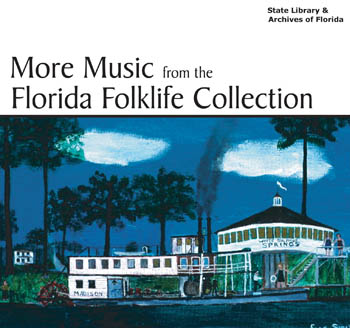
A stepsister to "Empress of the Blues" Bessie Smith, Mary Smith McClain, also known as "Diamond Teeth Mary," was born in Huntington, West Virginia, in 1902. With a career spanning the better part of a century, McClain's "Diamond Teeth" moniker resulted from the singer lodging diamonds between her teeth, perhaps to make her performances more unique and memorable. Performing with Blind Willie James, a noted Florida-born blues vocalist and piano man, McClain is featured singing the catchy "Give a Poor Dog a Bone" at the 1993 Florida Folk Festival. A long-time beloved resident of the Tampa Bay area, McClain died in April 2000 at the age of 97.
Kind Hearted Woman
Johnny Shines
Recorded April 16, 1977 by the Florida Folklife Program at the Portable Folk Festival, White Springs, Florida
Blues impresario Johnny Shines pays homage to the inimitable and mysterious blues legend Robert Johnson with his interpretation of "Kind Hearted Woman," a song Johnson had first recorded on November 23, 1936 in San Antonio. Former Rolling Stones bassist Bill Wyman described Shines in his book, Bill Wyman's Blues Odyssey: A Journey to Music's Heart & Soul, as "one of the last links to the Robert Johnson legacy, as he had traveled and played with Johnson as far afield as Canada, when he was barely out of his teens." With "Kind Hearted Woman," Shines fails to disappoint.
Wayfaring Stranger
Bill Monroe and His Bluegrass Boys
Recorded May 28, 1993 by the Florida Folklife Program at the 1993 Florida Folk Festival (Old Marble Stage), White Springs, Florida
The "Father of Bluegrass," William Smith "Bill" Monroe (1911-1996) was born in western Kentucky near the Ohio border. History was in the making when Monroe assembled his group, the Bluegrass Boys, in 1938. A high-pitched tenor and accomplished mandolinist, Monroe joined the cast of the Grand Ole Opry on Nashville's WSM the following year. The term "bluegrass" was coined to describe the unique genre of country music created by Monroe and his ensemble, which, at one point, comprised Earl Scruggs (banjo), Lester Flatt (guitar) and Chubby Wise (fiddle). "Wayfaring Stranger," often found in old southern hymnals, features the vocals of Monroe, and ably demonstrates the sound by which generations of musicians have been inspired.
In an effort to perpetuate elements of Florida's distinctive history, the Florida Memory Project is inadvertently preserving various aspects of the southern legacy. No doubt, music is one of the greatest gifts to be handed down by our ancestors and, through the music of the Florida Folklife Collection, the memory of great musicians can live on and timeless songs can be cherished by forthcoming generations who seek to discover the roots of whatever music they might fancy at the time.
Kind Hearted Woman
Johnny Shines
Recorded April 16, 1977 by the Florida Folklife Program at the Portable Folk Festival, White Springs, Florida
Blues impresario Johnny Shines pays homage to the inimitable and mysterious blues legend Robert Johnson with his interpretation of "Kind Hearted Woman," a song Johnson had first recorded on November 23, 1936 in San Antonio. Former Rolling Stones bassist Bill Wyman described Shines in his book, Bill Wyman's Blues Odyssey: A Journey to Music's Heart & Soul, as "one of the last links to the Robert Johnson legacy, as he had traveled and played with Johnson as far afield as Canada, when he was barely out of his teens." With "Kind Hearted Woman," Shines fails to disappoint.
Wayfaring Stranger
Bill Monroe and His Bluegrass Boys
Recorded May 28, 1993 by the Florida Folklife Program at the 1993 Florida Folk Festival (Old Marble Stage), White Springs, Florida
The "Father of Bluegrass," William Smith "Bill" Monroe (1911-1996) was born in western Kentucky near the Ohio border. History was in the making when Monroe assembled his group, the Bluegrass Boys, in 1938. A high-pitched tenor and accomplished mandolinist, Monroe joined the cast of the Grand Ole Opry on Nashville's WSM the following year. The term "bluegrass" was coined to describe the unique genre of country music created by Monroe and his ensemble, which, at one point, comprised Earl Scruggs (banjo), Lester Flatt (guitar) and Chubby Wise (fiddle). "Wayfaring Stranger," often found in old southern hymnals, features the vocals of Monroe, and ably demonstrates the sound by which generations of musicians have been inspired.
In an effort to perpetuate elements of Florida's distinctive history, the Florida Memory Project is inadvertently preserving various aspects of the southern legacy. No doubt, music is one of the greatest gifts to be handed down by our ancestors and, through the music of the Florida Folklife Collection, the memory of great musicians can live on and timeless songs can be cherished by forthcoming generations who seek to discover the roots of whatever music they might fancy at the time.
The author gratefully acknowledges the assistance of Joanna (Jody) Norman, Archives Supervisor, and Katrina Harkness, Education Officer, of the State Library & Archives of Florida.
BIBLIOGRAPHY
Allen G. Breed, "Old South's distinction melts away," Atlanta Journal-Constitution. December 29, 2005.
Maggie Council di Pietra, "Remembering 'Queen of Blues'," St. Petersburg Times. April 28, 2000.
Stephen Holden, "Review/Music: Voice From the Past: Spry and Not Shy," New York Times. April 25, 1994.
Randy Noles, Orange Blossom Boys: The Untold Story of Ervin T. Rouse, Chubby Wise and the World's Most Famous Fiddle Tune (Anaheim Hills, California: Centerstream Publishing, 2002).
Robert Santelli, The Big Book of Blues (New York: Penguin Books, 1993, 2001).
Robert Santelli, Holly George-Warren and Jim Brown, eds., American Roots Music (New York: Harry N. Abrams, Inc., 2001).
Charles Reagan Wilson and William Ferris, eds., Encyclopedia of Southern Culture (Chapel Hill and London: University of North Carolina Press, 1989).
Bill Wyman, Bill Wyman's Blues Odyssey: A Journey to Music's Heart & Soul (New York: Dorling Kindersley Publishing, Inc., 2001).
"Folklife Database: Interview and music performance with blues singer (Blind) Johnny Brown," Florida Memory: State Archives of Florida. Retrieved August 4, 2008: http://www.floridamemory.com
"Georgia Sea Island Singers," New Georgia Encyclopedia. Retrieved July 25, 2008: http://www.newgeorgiaencyclopedia.org
Allen G. Breed, "Old South's distinction melts away," Atlanta Journal-Constitution. December 29, 2005.
Maggie Council di Pietra, "Remembering 'Queen of Blues'," St. Petersburg Times. April 28, 2000.
Stephen Holden, "Review/Music: Voice From the Past: Spry and Not Shy," New York Times. April 25, 1994.
Randy Noles, Orange Blossom Boys: The Untold Story of Ervin T. Rouse, Chubby Wise and the World's Most Famous Fiddle Tune (Anaheim Hills, California: Centerstream Publishing, 2002).
Robert Santelli, The Big Book of Blues (New York: Penguin Books, 1993, 2001).
Robert Santelli, Holly George-Warren and Jim Brown, eds., American Roots Music (New York: Harry N. Abrams, Inc., 2001).
Charles Reagan Wilson and William Ferris, eds., Encyclopedia of Southern Culture (Chapel Hill and London: University of North Carolina Press, 1989).
Bill Wyman, Bill Wyman's Blues Odyssey: A Journey to Music's Heart & Soul (New York: Dorling Kindersley Publishing, Inc., 2001).
"Folklife Database: Interview and music performance with blues singer (Blind) Johnny Brown," Florida Memory: State Archives of Florida. Retrieved August 4, 2008: http://www.floridamemory.com
"Georgia Sea Island Singers," New Georgia Encyclopedia. Retrieved July 25, 2008: http://www.newgeorgiaencyclopedia.org
Author: Greg Freeman. Published August 23, 2008.
Copyright
Southern Edition
All Rights Reserved
Southern Edition
All Rights Reserved
All materials contained on this site, including text and images, are protected by copyright laws and may not be reproduced without prior written permission from the publisher. Where applicable, use of some items contained on this site may require permission from other copyright owners.
Fair Use of text from SouthernEdition.com is permitted to the extent allowed by copyright law. Proper citation is requested. Please use this guide when citing a Southern Edition article.
Contact Greg Freeman or SouthernEdition.comFair Use of text from SouthernEdition.com is permitted to the extent allowed by copyright law. Proper citation is requested. Please use this guide when citing a Southern Edition article.
